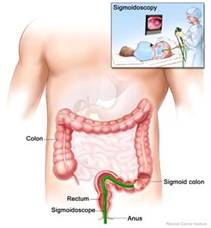Physical Examination
Most of the cases of colorectal cancers have no signs during examination by the doctor. However, the following signs might be detected in some cases:
- Mass felt in the abdomen
- Growth felt in the rectum
Colonoscopy
This is a flexible tube with a camera at the tip which allows the internal view of the colon and rectum to be viewed on a monitor. The tube is inserted through the anus and will go as far as the caecum. This is the gold standard to detect any abnormality in the rectum and colon. Biopsy of any abnormal tissue can be obtained at the same time. This procedure is usually performed under sedation.

Colonoscopy : Adapted from National Cancer Institute
Sigmoidoscopy
Sigmoidoscopy comes in two forms, flexible and rigid. They are similar to colonoscopy except for a shorter length. Hence, they are being used to examine only the rectum and lower part of the colon. In contrast, no sedation is needed for this procedure.

Flexible Sigmoidoscopy : Adapted from National Cancer Institute
CT Virtual Colonoscopy Examination
This is a special CT scan of the abdomen and pelvis whereby a small tube is inserted into the anus and some carbon dioxide gas is used to inflate the bowel just before the scan. The computer will reconstruct the images so that polyp or tumour that are larger than a certain diameter in the colon or rectum can be detected. Even though this test is less invasive then colonoscopy, the sensitivity of this test is not as good as colonoscopy.
Tumour Markers
CEA (Carcinoembryonic antigen) is a commonly used tumour marker which can be measured by blood testing. This test is not very sensitive, hence normal CEA levels does not rule out colorectal cancer. However, baseline levels of CEA is important in the prognosis and the future follow up of patients after surgery.
Faecal Occult Blood Test
This is a test to check stool for blood that is too small in amount to be detected by the naked eye. A small amount of stool is collected by the patient and returned to the doctor for the test. If the test is positive, further tests (i.e. colonoscopy) is indicated to identify the cause.
Barium Enema Study
A liquid that contains barium (a silver-white metallic compound) is injected into the anus. The barium will coat the colon and rectum before series of X-rays is taken. Any growth in the colon and rectum will be detected.
Updated:: 13/03/2019 []
MEDIA SHARING

























